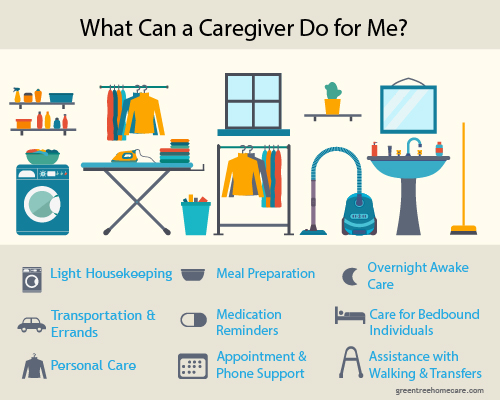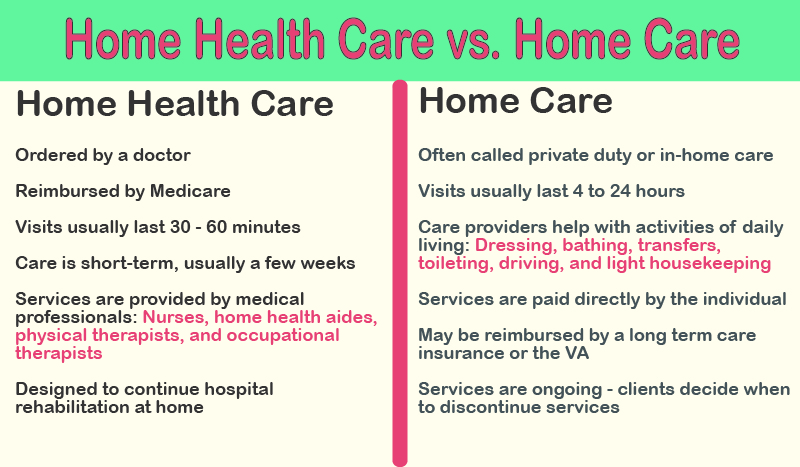This article covers who might need San Diego home care, how to hire help, costs, and resources that may offer free services. It also offers other gems of information that answer your questions about home care in San Diego and the surrounding cities.
You have been told (or realize) that a loved one isn’t doing as well as he or she should. You spring into action to help, but realize between doctors, hospitals, pharmacies, legal issues, family meetings, and plain old day-to-day decisions, you have taken on a full-time job.
You know you can’t do it all alone, but where can you find someone to help?
Who Needs Home Care?
Usually, people begin looking for in-home support when something big happens to their loved one. A fall, hospitalization, or a dangerous lapse in judgment are often the catalysts that force friends and family to step in. But how do you know it is the right time to call in additional support – especially if it isn’t really wanted?

So, now you know when it might be time to offer more support, either from friends and family, or through a paid professional. But, how do you have this conversation?
Your best bet is to know your audience. Some adults dealing with a physical or mental change recognize the need to plan and organize practical services. Others . . . do not.
Communicating with Your Loved One About Home Care
Imagine suddenly being unable to tie your shoes or get your own groceries. It is a scary feeling. Often people experiencing declines are reluctant to share how bad things have gotten. They fear having to watch friends, family, and strangers radically change the world they have spent a lifetime building.
If in doubt, remember the number 1 tip for having the conversation about additional in-home support:
Put yourself in the shoes of your loved one!
Make sure to have a conversation where the needs and thoughts of the recipient are highly valued. Remember to be patient and supportive of your loved ones. You can offer to move them into your home, find the perfect assisted living, or hire the best home care provider. Ultimately, they are the ones who have to live with the change day in and day out. So, you need to make sure your loved one is comfortable with the arrangements put in place.
Services Offered by San Diego Home Care Providers
Now that you have a handle on when your loved one might need additional care, and how to begin the conversation, you may be wondering exactly what responsibilities a professional caregiver will actually take on.

Light Housekeeping
Great caregivers know that a tidy home is part of giving great care. Most caregivers will gladly handle dusting, vacuuming, cleaning of kitchens and bathrooms, laundry, dishes and other light cleaning duties. It is important to make sure your care providers are onboard with taking on these tasks as part of their job duties. Home care aides are not house cleaners and will likely decline cleaning that requires lots of reaching or bending. Don’t expect your caregiver to clean out gutters or scrub tile grout.
Errands and Transportation
Since restricted driving is a big reason the elderly or incapacitated need care, transportation is a common service provided by caregivers and agencies. The benefit of using a caregiver to provide transportation is having experienced help getting in and out of vehicles and during the activity. If you really only need driving assistance with no hands-on care, there are services that can provide just transportation. There are resources for transportation further down the page.
Personal Care
Caregivers help individuals with intimate personal tasks on a professional level. Great caregivers will happily help clients with using the bathroom, dressing, grooming, bathing, dental care and hair care. Keeping clean will promote dignity and compassion. Make sure to choose a care provider comfortable providing these services.
Meal Preparation
This is a big, important category. Home care is often about making sure people are healthy and receive regular nutritious meals. Loved ones experiencing short term memory impairment and weight loss, may be missing important hunger cues or forgetting how to make or get food. According to the Permanente Journal, malnutrition rates range from 12% to 50% among elderly people who are hospitalized. Simply having someone help with food prep can improve overall health. More active seniors may just benefit from assistance navigating the grocery store, others will need more support. Make sure you thoroughly discuss your expectations for food preparation with family and professional care providers. If you prefer to have food brought in, there are several local resources that deliver food to seniors in the resources section further down this article.
Medication Reminders
This can be a bit of a grey area. Some private caregivers will dispense and give medications. However, others will not as it may put them at risk of lawsuits if something were to go wrong with dosage or side effects. California law leaves medication administration in the hands of family and friends or medical professionals. Professional home care agencies offer medication reminders. This means a family member pre-doses meds in a medication box, and caregivers offer meds at specific times.
Appointment and Communication Support
Caregivers are instrumental at connecting family with the daily activities of clients. You can expect professional caregivers to help set doctor’s appointments, organize outings, and communicate with approved friends and family members. Make sure you and any professional caregivers set expectations for your communication. If your relative enjoys using the internet, make sure your care provider knows this and is willing to spend time on social media on the behalf of your loved one. It’s a great way to keep them engaged with the lives of their family and friends.
24 Hour and Overnight Support
Caregivers can be very helpful in supporting the care of a loved one. Professional caregivers can work night shifts where they stay awake to care for a person who wanders or needs constant care. Utilizing professional services to augment the care of family member is a great way to keep costs lower without burning family members out. Sometimes a person who is unable to move without assistance, or who cannot be left alone requires 24-hour assistance. Home care providers usually structure round-the-clock home care into 3 eight-hour shifts or 2 twelve-hour shifts.
Bedbound Care
If your loved one spends a majority of time in bed, she will require specialized care. Regular movement and repositioning is essential for protecting against open sores and rigidity.
Assistance with Moving and Transfers
Assistance with moving, also called ambulation, is often an import part of reducing the incidence of falls. Caregivers help clients get used to using tools like canes and walkers. In some cases, having the support of a dedicated caregiver helps people be more active and their mobility improves. If a loved one is at risk of falls, it is a good idea to have someone handy to help with getting up, sitting down, and moving around.
How to Pay for San Diego Home Care
Unfortunately, the San Diego home care scene doesn’t offer much financial support for senior services. But, a few programs may help pay for services or offer free in-home care.
At this time, Medicare and medical insurance companies do not provide payment for non-medical home care or assisted living services in CA. There are a few policies that may offer reimbursement for certain home care tasks, but these are very rare.
Veterans Association Aide and Attendance Program
VA Aid and Attendance – This is an awesome program that is greatly underutilized. It is a medical expense reimbursement program, and costs for home care and assisted living are included in the calculations for medical expenses. The good news is that it is completely free to apply for the program and the reimbursement rates are great. The bad news is it can take several months to get through processing and receive money.
Eligible veterans may receive more than $2,000 per month depending on how many people live in the home, and some fancy government calculations about income. There is a good article from California Advocates for Nursing Home Reform that talks about the details of qualifying and applying for the program.
The process of collecting paperwork, determining eligibility, and filling out documents correctly can feel overwhelming. Fortunately, there are people who can help you weed through the process. You can contact the VA directly through the San Diego VA Regional Office.
You can also find professional attorneys and financial planners who can offer advice about VA programs.
Long Term Care Insurance
San Diego Long term care insurance policies (LTCI) – LTCI companies are not free. In fact, a person would have purchased a plan many years ago and paid a monthly premium. The reason it is mentioned in the payment resources section is that sometimes policies are overlooked. It is a good idea to ask loved ones if there is an active policy.
LTCI policies may pay for San Diego home care services. Depending on how the policy is written, they may cover a big chunk of the cost of care from either an in-home care provider or assisted living community. Some of them have clauses for home modifications and supplies. Be sure to get a copy of the policy.
LTCI policies can be a little difficult to initiate. There is often an elimination period that requires the beneficiary to pay out of pocket, and there has to be excellent documentation to keep the policy active and reimbursing. Sometimes there are hiccups, and a company may stop reimbursing without warning. Usually, any issues in policy interruption can be fixed with a phone call.
It is important you use the correct verbiage and documentation when working with LTCI companies. If you need legal representation, there are appeal processes and free legal resources for navigating LTCI insurance issues.
San Diego Government Programs
San Diego Ombudsman program – The San Diego Department of Health & Human Services offers a program designed to protect elderly patients in long term care. The Ombudsman program mainly deals with the rights of residents in care facilities. However, you can contact them for free advice and information about your relative’s rights while being cared for, and services that can assist you in finding the best care for your loved one.
In-Home Supportive Services – IHSS is offered through the department of Health & Human Services. They provide help with meal preparation, dressing, house cleaning, shopping, laundry, bathing and grooming.
This program has very low-income recipients, and the number of hours provided might be minimal. But, for individuals with limited resources, this is a great place to start.
Nonprofit Organizations
Church programs – If your loved one is part of a church community, you may want to reach out to that organization. Some churches have senior programs where volunteers help with tasks like transportation and meal prep. Not all churches have a defined program, but it may be worth an ask.
St. Paul’s PACE – St. Paul’s Program of All-Inclusive Care for the Elderly (PACE) is a Managed Care Health Plan for San Diego County seniors who wish to continue living in their own home despite chronic health needs. Services include medical care, ongoing rehabilitative therapies, in-home care services, day center activities, social work, and transportation. For those with Medi-Cal and no share-of-cost, St. Paul’s PACE services are FREE. Even medications are free.
Alzheimer’s Association – If your relative is living with dementia, at some point he will likely need additional care support. The Alzheimer’s association is a wonderful resource focused on supporting both you, the family caregiver, and your loved one. They offer support groups, and education.
Do I Need Home Care or Home Health Care?
As if you didn’t have enough to keep straight, someone decided to create two different care services and name them the same thing. Home care and home health care are constantly confused, and the names are sometimes used interchangeably. So, what’s the difference?
Tip: if someone is talking about medical services performed by a nurse or physical therapist, they are talking about home health care. If they use the phrasing “private duty”, “in-home care”, or describe care lasting for extended periods of time, they most likely mean home care.
How does hospice fit into home care?
Hospice and home health are both Medicare reimbursable services ordered by a doctor. Hospice operates under a different philosophy. Their mission is to provide support, promote quality of life, and pain management. Generally, they do not offer rehabilitative or treatment-based services.
How to Arrange Home Care
According to the national alliance for caregiving, more than 65 million people, or 29% of the country’s population, care for the chronically ill in a given year. That is a lot of caregiving! While many of those providing care are family, a large portion of those people are professional caregivers.
If you choose to enlist the help of paid care professionals, there are a few ways to go about arranging care. You can find a private caregiver or use the services of a professional home care agency.
Private Caregivers
Private caregiving is any situation where you or your loved one directly hire a paid caregiver. Caregivers can be friends, neighbors, recommendations from your circle of friends, or people you find online or in job postings. There are even a few staffing companies who specialize in connecting seniors with private caregivers.
People often chose a private caregiver over agency support to save on the cost of care. Hiring directly typically means a $5-$15 per hour cost savings. But there are additional costs, and several factors you should consider before hiring privately. Most importantly, remember that you or your loved one are considered the employer. That means you are responsible for payroll, employer taxes, unemployment, and abiding by employment laws.
But, what if I 1099 the caregiver? Nope. Caregivers rarely pass the sniff test for an independent contractor. In the eyes of the government most caregiver/client relationships are employer/employee arrangements. If you, or the person receiving care, sets the time, days, and expectations of how tasks are completed, you are most likely considered the employer.
How to Hire a Private Caregiver
Don’t let the intricacies bog you down. If you choose to hire a private caregiver here are a few tips to help you create the best arrangement possible:
Make sure you have a contract
Not only does this protect you, but it creates a safe place for conversation and hammering out expectations.
Know what you want before you begin hiring
Know what you can afford, what tasks you need accomplished, and a preferred schedule. You don’t want to get far into the hiring process to realize there is no way you can agree on pay or schedules.
Take your time with hiring
Finding the right person to care for a loved one is very important – it may take some time. Many professional agencies report weeding through hundreds of applications to find one amazing caregiver. Once you find someone you like, make sure you look at their work history and do reference checks. You want to look for people who have experience and a work history that shows stability.
Make arrangements for workman’s comp insurance
Many people believe that their homeowner’s policy covers people providing services in their home. But, most likely you will want to add a rider that specifically covers household employees. Contact your home or renter’s insurance provider to ask about a household employee rider.
Make sure they join the CA state registry
The state of CA has a registration process specifically for homecare providers that includes a Department of Justice background check. When your chosen caregiver joins the registry, he will also need to get a live scan background check. The total cost for the whole process is a little over $100, but they can transfer this active home care aide registration to other employers if they choose.
Consider overtime in your compensation planning
Because this is an employer/employee relationship, you will need to calculate overtime pay for your caregiver. If you have chosen to use a payroll company, they can help you calculate how much that might be based on your chosen schedule.
Fill out appropriate government documents and set up payroll
You can find the documents you need online, but it is easier to work with a payroll provider or professional. Make sure to choose someone who works with household employers. The last thing you need is an IRS headache!
Payroll Support
There are lots of payroll providers, but HomeWork Solutions specializes in household payroll. Their online portal is easy to use, and they offer tons of educational information on their website. They are based in Virginia and can handle all federal, state, and local taxes across the country.
Legally Nanny, a law firm that specializes in representing household employers, is another good and local option for new employee legal and tax issues. Based in Orange County, Legally Nanny prepares new hire paperwork and provides a personally tailored employment agreement and online payroll calculator, all for one flat fee. Legally Nanny also defends families facing investigations, audits, wage claims, or administrative charges or litigation. And, yes – these do happen.
Caregivers – Money and Rent
Never give private caregivers access to money and bank accounts. If you or a loved one needs help with money management, there are professional fiduciaries that can help.
Important!!! – It is not recommended for you to offer a live-in situation or free rent in exchange for care. California has very renter-friendly laws. This means if the situation turns sour, you may have to go through a costly and long eviction process. Even though you and the caregiver both know the living arrangement is part of the compensation, the law may see it differently. On the flip side, California employment law tends to favor the employee. As an employer, you will need to follow wage and overtime laws. If a disgruntled employee files a claim and you haven’t paid her according to the law, you may be at risk.
Home Care Agencies in San Diego
In 2017, the state of California implemented home care regulations. This move forced home care providers to adhere to certain standards. Home care agencies must do the following:
- Take on the employer responsibility for caregivers and issue W2s
- Ensure that all caregivers have a current clear tuberculosis test
- Have a background check through the Department of Justice
- Complete annual training
- Keep complete records on a caregiver
These tasks are the basic functions of all home care agencies. But, if they all do these things, what makes a good home care agency? Oooh sooo much more!
What Makes a Home Care Agency Great
Great agencies are amazing communicators. You should never have to call to see who is coming to your house or leave messages that take hours or days to be returned. Great agencies keep you in the loop if your caregiver is stuck in traffic, or your loved one has a change of condition. In addition, many agencies have field managers that periodically check in on clients and ensure the quality of care is awesome. Look for an agency that answers the phone locally 24/7. Few experiences are more frustrating than getting stuck in call center limbo if a caregiver hasn’t shown up, or you have to take a loved one to the hospital.
Ask the perspective agency how they hire their caregivers. You want to make sure they are very selective with who they bring into their organization. Every home care has a unique vibe from the caregivers to the leadership. Make sure you like that vibe.
San Diego home care agencies are partners. Once you make your selection, they should be able to adapt to any changes in care needs and scheduling that comes along. They can also offer guidance, and additional resources when you have questions.
Why Choose a San Diego Home Care Agency
The main benefits of choosing a San Diego home care agency over private caregiver is the support and protection. Oh, and of course the stress relief. Anyone who manages care for a loved one can vouch for the stomach dropping feeling when a caregiver calls in sick and you have no plan B. Usually this happens on a day you have somewhere important to be – thanks Murphy! Great agencies get these calls directly from the caregivers, and usually have a solution by the time you know there is an issue.
Because agencies assume the employment risk, your role is simple. Communicate any scheduling changes, share feedback about the caregiver, and pay invoices. Other than that, they take care of the rest. Legal issues, unemployment claims, and workplace injuries are all part of the home care industry. Leaving the employer responsibility in the hands of professional agencies takes the burden off you and your loved one.
Usually, a home care agency has experienced managers who can help family caregivers arrange services at appropriate times. Knowing how to find wonderful caregivers takes practice. Established home care agencies hire hundreds of employees and get great at finding talented caregivers.
Cost of San Diego Home Care
Most San Diego home care agencies cost between $24-30 per hour. This is significantly higher than you will pay a private caregiver. But, you need to factor in all the costs for hiring, onboarding, management, re-staffing, insurance, taxes, and unemployment to get a true comparison rate. Check out this article about the cost of home care in San Diego for a deeper look at agency and private caregiver rates.
How to Hire a Home Care Agency
If you decide to go with a San Diego home care agency, here are a few tips:
- Talk with neighbors and friends who have used an agency before. If they had a great experience you may want to reach out to that company.
- Go online and check out reviews. Often you can get a sense of what to expect from an organization based on the experiences of others.
- Call the top two or three companies you like and get a feel for their service and culture. Remember, it is important that you feel supported and connected to the mission of the organization since you may be working together for a while.
- Check licensing – The state does in-person audits for home care organizations. They publish any deficiencies they find online.
Hiring a Company and What to Expect from the Process
Pick top 2-3 companies and set up in person meetings – they may refer to this as an assessment.
Look for cues from the representative about the quality of the service: does the company seem focused on quality and in-person support? Does the company have the current staff to meet your needs? If you have a specific requirement, do they have expertise in that area – i.e., long term care, dementia care?
Ask how the company supports the in-home care provider – you don’t want a “set and forget it” service. One of the key benefits of using an agency is the extra level of oversight – especially for family members who are out of the area.
There are a few companies who charge for the initial assessment visit – most do not!
Make sure you understand their policies. If a loved one falls, how do they handle it? Do they charge for last-minute changes that are outside of your control like an emergency hospitalization? How do they handle their billing process?
Working With An Agency
Select the agency that best meets your needs and begin working together. Usually, people get used to caregivers in the home within 1 to 3 weeks. Be ready for this period of unsettlement, and help loved ones determine what is working, and what needs tweaking.
Expect most companies to have a 4-hour daily minimum. There may be a few companies that will provide service 1-2 hours at a time, but you will pay a premium rate for these shifts. Most companies have minimums because short shifts are very difficult to staff. These shifts often have high turnover.
Domestic Referral Agencies
Domestic referral agencies are different than licensed home care agencies. They do not employ caregivers and are specialized staffing agencies. They may be less expensive than licensed home care agencies, but they do not offer the same protections. In addition, the cost and management of payroll, insurance, and tax is generally your responsibility.
They can be a great resource if you prefer to hire privately since they do much of the screening. Great domestic referral agencies offer education and support to their clients. But, they do not get directly involved with the caregiver. While domestic referral agencies play a valuable role in the San Diego home care market, they are more of a DIY solution. If you want comprehensive protection and oversight, then you want to look for a licensed home care organization.
San Diego Home Care Tools
If your loved one needs help with personal care or has trouble with ambulation (movement) or transfers, there are tools you can buy to help deliver care. You can buy supplies directly from the links below or pick them up from various local stores.
Medicare may supply some of these products if they are prescribed by your doctor, or you are working with a home health or hospice agency.
Disposable Products
Gloves – If any hands-on care is offered, gloves are a must. You can pick them up at any drug store if you prefer to buy local. Try to find disposable gloves that are latex and power free.
Adult briefs (disposable incontinence products) – There are two different options to consider. One is a disposable underwear style. The other is a brief with tabs. Often, the ones with tabs make changing bed bound individuals easier. You may want to experiment with different styles to see what works best for your loved one, and double check the sizing. Generally, hospice companies supply briefs.
Pads – Disposable pads are essential if your loved one is confined to bed. You must keep skin clean and dry. If there is an accident, pads are easily replaced.
Assistive Devices
Walker – Walkers come in many styles. Walkers without wheels are more stable but have to be picked up with each step. Because of the lifting action, they tend to be a little slower. Rollator walkers have four wheels and brakes. These can move quickly, but your loved one needs to be able to use the brake.
Wheelchairs – Wheelchairs from basic to high tech off-road models. For an occasional use model, you can check out the link.
Bed Sensors – These are great tools for loved ones who get up frequently and need immediate ambulation support. The wireless versions run around $100 and have a portable alarm a caregiver can keep with them.
Shower chairs – There are tons of designs for shower chairs. Some fit completely inside the bathing area, while others straddle the side so your loved one can slide in and out.
Bedside commodes – These are great if you loved one has trouble getting to the bathroom in time. You can place them by the bed at night to help reduce the incidence of night-time falls.
Powered Equipment
Lift chairs – These power chairs slowly raise the sitter into a standing position. They can be really helpful for people with low energy, pain, and poor motor planning. Carefully consider if a lift chair is appropriate. To preserve mobility, you have to practice mobility.
Hospital beds – If a person becomes bed bound, bed access becomes essential. Bathing, feeding, toileting, and socialization may all happen in the bed. You can raise, lower, and change positions in a hospital bed.
Safety Bars
Grab bars – Grab bars are great for bathroom and shower areas. You can buy and install them yourself or use a local company. San Diego Grab Bars has a great online reputation and offers quick install with straightforward pricing.
Bed rails – There are different kinds of rails, but they offer something to hold onto when getting in and out of bed. They are helpful for keeping your loved one from falling out of bed.
Aging in Place
If your loved one needs mobility equipment, like stair lifts or ramps, or you have concerns about your loved one’s home safety you can contact 101 Mobility for a full line of solutions. They offer sales and rentals, and can help you with home modifications for aging in place.
Senior Transportation Services San Diego
If your love one is thriving and only needs occasional transportation support, there are a few resources in the San Diego area that specialize in senior transportation.
San Diego Home Care Free Resources
Sharp Health System – If your loved one is utilizing sharp medical services they may be able to arrange transportation for free. You can call (619) 740-4288 to make an appointment.
ElderHelp of San Diego – this non-profit, volunteer-based organization does much more than provide transportation. They offer donation-based rides in areas where there are available volunteers, and have education and care coordination support services, too.
Paid Services
Public Transportation – The San Diego public transit system has a special program for adults with disabilities. This is a great solution for people who cannot easily use traditional bus routes. The fee is $4.50 each way, and the application can be done by phone on 877 232-7433 if internet is an issue.
GoGoGrandparent – this service harnesses the power of Uber and Lift without a smartphone, so the services are more accessible for elderly people. Once an account is set up, your loved one can call and request a ride from an actual person rather than through technology.
Marquee Medical Transport – This is a paid service that offers transportation to medical appointments, the grocery store, or anywhere else in San Diego. They offer ride coordination through Uber and Lyft like GoGoGrandparent. Most noteworthy, they also have a service line that caters to riders who have physical or mental limitations. These drivers speak fluent English, and help riders with walkers, wheelchairs, and gurney support.
San Diego Home Care Wrap-Up
When it comes to finding San Diego home care and support for your loved one, there really is a lot to think about. As you begin to pull the pieces together, you will find a thriving senior care community. You’re undoubtedly still feeling overwhelmed at the amount of work ahead of you. Hopefully, you also feel relieved at the number of options open to you. Use the information provided here to ask the right questions to find the best home care solutions for you and your loved one.




























